| Listing 1 - 10 of 22 | << page >> |
Sort by
|
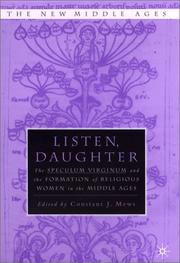
ISBN: 0312240082 Year: 2001 Publisher: New York, N.Y. Palgrave
Abstract | Keywords | Export | Availability | Bookmark
 Loading...
Loading...Choose an application
- Reference Manager
- EndNote
- RefWorks (Direct export to RefWorks)
The words 'Listen daughter' (Audi filia, from Psalm 44 in the Latin Vulgate) were frequently used in exhortations to religious women in the twelfth century. This was a period of dramatic growth in the involvement of women in various forms of religious life. While Hildegard of Bingen (1098-1179) has become widely known in recent years as one of the most eloquent and original voices of the period, she is often seen as a figure in isolation from her context. She lived at a time of much questioning of traditional models of religious life, by women as well as by men. This volume introduces readers to a range of strategies provoked by the growth in women's participation in religious life in one form or another, as well as to male responses to this development. In particular, it looks at the 'Mirror for Virgins' (Speculum Virginum), an illustrated dialogue between a nun and her spiritual mentor written by a monk not long before Hildegard started to record her visions. While this treatise engages in dialogue with a fictional virgin, other writings present women (not just Hildegard) as teaching both women and men. An appendix will provide the first English translation of significant excerpts from the Speculum, as well as from other little known texts about religious women from the age of Hildegard. The underlying concern of this volume is to examine new ways in which religious life for women was conceived by men as well as interpreted in practice by women within a society firmly patriarchal in character.
Christian church history --- Christian spirituality --- anno 1200-1499 --- anno 800-1199 --- Church history --- -Monasticism and religious orders for women --- Women in Christianity --- Christianity --- Monasticism and religious orders for women --- Convents --- Nuns --- Sisterhoods --- Ecclesiastical history --- History, Church --- History, Ecclesiastical --- History --- Catholic Church --- Monasticism and religious orders for women. --- Women in Christianity. --- anno 500-1499 --- Middle Ages, 600-1500 --- Speculum virginum. --- Jungfruspegel --- Religious communities --- Members of congregations --- Theology --- Book
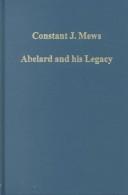
ISBN: 086078861X 9780860788614 Year: 2001 Volume: 704 Publisher: Aldershot: Ashgate,
Abstract | Keywords | Export | Availability | Bookmark
 Loading...
Loading...Choose an application
- Reference Manager
- EndNote
- RefWorks (Direct export to RefWorks)
Abelard, Peter, --- Abaelard, Peter, --- Abaelardi, Petri, --- Abaelardus, --- Abaelardus, Petrus, --- Abailard, Peter, --- Abailard, Pierre, --- Abailardus, Petrus, --- Abeilard, Pierre, --- Abélard, Pierre, --- Abelard, Piotr, --- Abelardo, --- Abelardo, Pietro, --- Abeli︠a︡r, Petr, --- Abelʹi︠a︡rd, Petr, --- אבעלאר, --- Abelard, Peter --- Abelard, Peter, - 1079-1142
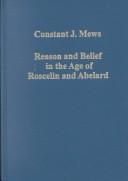
ISBN: 0860788660 9780860788669 Year: 2002 Volume: CS730. Publisher: Aldershot: Ashgate,
Abstract | Keywords | Export | Availability | Bookmark
 Loading...
Loading...Choose an application
- Reference Manager
- EndNote
- RefWorks (Direct export to RefWorks)
Filosofie [Middeleeuwse ] --- Medieval philosophy --- Middeleeuwse filosofie --- Philosophie médiévale --- Philosophy [Medieval ] --- Theology --- Philosophy, Medieval. --- Théologie --- History --- Histoire --- Roscelin, --- Abelard, Peter, --- Théologie --- Philosophie médiévale --- Middle Ages, 600-1500 --- Roscelin of Compiègne --- Abelard, Peter --- Middle Ages, 500-1500 --- Theology - History - Middle Ages, 600-1500. --- Roscelin, - of Compiègne, - ca. 1050-ca. 1125? --- Abelard, Peter, - 1079-1142.
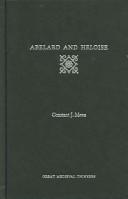
ISBN: 0195156889 0195156897 019983542X 1423720350 9786611196790 1281196797 0198035683 9780195156881 9780195156898 Year: 2005 Publisher: Oxford: Oxford university press,
Abstract | Keywords | Export | Availability | Bookmark
 Loading...
Loading...Choose an application
- Reference Manager
- EndNote
- RefWorks (Direct export to RefWorks)
Abelard, Peter, --- Héloïse, --- Héloïse, --- Abaelard, Peter, --- Abaelardi, Petri, --- Abaelardus, --- Abaelardus, Petrus, --- Abailard, Peter, --- Abailard, Pierre, --- Abailardus, Petrus, --- Abeilard, Pierre, --- Abélard, Pierre, --- Abelard, Piotr, --- Abelardo, --- Abelardo, Pietro, --- Abeli︠a︡r, Petr, --- Abelʹi︠a︡rd, Petr, --- אבעלאר, --- Abelard, Peter, - 1079-1142. --- Héloïse, - 1101-1164.
Book
Year: 1986 Publisher: Louvain-la-Neuve Institut Supérieur de Philosophie
Abstract | Keywords | Export | Availability | Bookmark
 Loading...
Loading...Choose an application
- Reference Manager
- EndNote
- RefWorks (Direct export to RefWorks)
Book
ISBN: 9781472437327 1472437322 9780367879587 0367879581 9781315601755 9781317077060 9781317077077 Year: 2016 Volume: *40 Publisher: London: Routledge/Taylor & Francis,
Abstract | Keywords | Export | Availability | Bookmark
 Loading...
Loading...Choose an application
- Reference Manager
- EndNote
- RefWorks (Direct export to RefWorks)
"Ever since the time of Francis of Assisi, a commitment to voluntary poverty has been a controversial aspect of religious life. This volume explores the interaction between poverty and religious devotion in the mendicant orders between the thirteenth and fifteenth centuries. While poverty has often been perceived more as a Franciscan than as a Dominican emphasis, this volume considers its role within a broader movement of evangelical renewal associated with the mendicant transformation of religious life. At a time of increased economic prosperity, reformers within the Church sought new ways of encouraging identification with the person of Christ. This volume considers the paradoxical tension between voluntary poverty as a way of emulating Christ and involuntary poverty as situation demanding a response from those with the means to help the poor. Drawing on history, literature and visual arts, it explores how the mendicant orders continued to transform religious life into the time of the renaissance. The papers in this volume are organised under three headings, prefaced with an introductory essay by the editors: Poverty and the Rule of Francis, exploring the interpretation of poverty in the Franciscan Order; Devotional Cultures, considering aspects of devotional life fostered by mendicant religious communities, Franciscan, Augustinian and Dominican; Preaching Poverty, on the way poverty was promoted and practiced within the Dominican Order in the later Middle Ages and Renaissance." --
Monastic and religious life --- Poverty --- History --- Religious aspects --- Christianity. --- Franciscans --- Dominicans --- Spiritual life. --- Monastic and religious life - History - Middle Ages, 600-1500. --- Poverty - Religious aspects - Christianity. --- Ordres mendiants
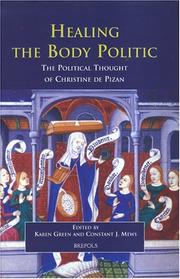
ISBN: 9782503537559 9782503516363 Year: 2005 Publisher: Turnhout Brepols
Abstract | Keywords | Export | Availability | Bookmark
 Loading...
Loading...Choose an application
- Reference Manager
- EndNote
- RefWorks (Direct export to RefWorks)
Christine de Pizan (1364-1431) has been recognized as a poet, early humanist and feminist precursor but rarely as political theorist whose works were intended to have a direct impact on the tumultuous politics of her time. The essays in this collection focus on Christine as a political writer and provide an important resource for those wishing to understand her political thought. They locate her political writing in the late medieval tradition, discussing her indebtedness to Aristotle, Aquinas and Augustine as well as her transformations of their thought. They also illuminate Christine’s ‘political epistemology’: her understanding of political wisdom as a part of theology, the knowledge of God. New light is thrown on the circumstances which prompted Christine to write on political issues and on her attitude to Isabeau of Bavaria. These essays show that Christine’s originality consisted in her capacity to modify and feminize the tradition of Christian Aristotelianism through the use of elements of Christian imagery, in particular Mariology, in order to construct an image of the virtuous and prudent monarch which had lost the explicitly manly and warlike character of the Aristotelian phronimos. This reconfigured image of the monarch lent itself to the extension which she developed in her more feminist works, which demonstrated the prudence of women and their capacity, in times of need, to function as authoritative political figures.
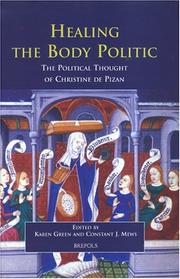
ISBN: 250351636X Year: 2005 Volume: 7 Publisher: Turnhout Brepols
Abstract | Keywords | Export | Availability | Bookmark
 Loading...
Loading...Choose an application
- Reference Manager
- EndNote
- RefWorks (Direct export to RefWorks)
Christine, --- Political and social views. --- Christine de Pisan --- Franse letterkunde van de middeleeuwen --- Littérature française du moyen-âge --- Philosophie politique --- Politieke filosofie --- ORESME (NICOLAS OU NICOLE), PHILOSOPHE, ECONOMISTE ET SAVANT FRANCAIS, 1320-1382 --- CHRISTINE DE PIZAN, CA. 1364-CA. 1431 --- IDEES POLITIQUES --- CRITIQUE ET INTERPRETATION --- PENSEE POLITIQUE ET SOCIALE --- HISTOIRE --- MOYEN AGE
Book
ISBN: 9789028962712 9789086870783 Year: 2011 Volume: 69 Publisher: Dordrecht [etc.] Springer
Abstract | Keywords | Export | Availability | Bookmark
 Loading...
Loading...Choose an application
- Reference Manager
- EndNote
- RefWorks (Direct export to RefWorks)
Act (Philosophy) --- Acte (philosophie de l'action) --- Action (Philosophie de l') --- Action (Philosophie) --- Action (Philosophy) --- Activité (philosophie) --- Agency (Philosophy) --- Agent (Philosophy) --- Agents --- Agir (philosophie) --- Handeling (Filosofie) --- Person (Philosophy) --- Personne (Philosophie) --- Persoon (Filosofie) --- Philosophie de l'action --- Franfurt, Harry G. --- Philosophy --- Frankfurt, Harry
Book
ISBN: 9782503532332 2503532330 9782503537689 Year: 2010 Volume: 9 Publisher: Turnhout Brepols
Abstract | Keywords | Export | Availability | Bookmark
 Loading...
Loading...Choose an application
- Reference Manager
- EndNote
- RefWorks (Direct export to RefWorks)
Communities of Learning: Networks and the Shaping of Intellectual Identity in Europe, 1100-1500 explores the fundamental insight that all new ideas are developed in the context of a community, whether academic, religious, or simply as a network of friends. The essays in this volume consider this notion in a variety of contexts and locations within Europe, from the pioneering age of translation activity in twelfth-century Toledo, when Jewish, Christian, and Muslim scholars came together to discuss Aristotle, to the origins of the University of Paris in the thirteenth century, and up to the period of great cultural renewal in France, Germany, and Italy in the fourteenth and fifteenth centuries. The collected essays bring together disciplinary approaches that are often discussed quite separately, namely that of the history of ideas, and the sociologies of both intellectual and religious life, with a view to exploring the multiplicity of communities in which ideas are pursued. Underpinning these various essays is an awareness of the delicate relationship between education and the diversity of religious practice and expression within Europe from 1100 to 1500. The collection emphasizes the fundamental continuity of intellectual concerns, which were shaped by both classical thought and monotheist religious tradition, but interpreted in a variety of ways.
Sociologie de la connaissance --- Civilization, Medieval --- Knowledge, Sociology of --- Learning and scholarship --- Social networks --- Networking, Social --- Networks, Social --- Social networking --- Social support systems --- Support systems, Social --- Interpersonal relations --- Cliques (Sociology) --- Microblogs --- Medieval learning and scholarship --- Education, Medieval --- Knowledge, Theory of (Sociology) --- Sociology of knowledge --- Communication --- Knowledge, Theory of --- Public opinion --- Sociology --- Social epistemology --- Medieval civilization --- Middle Ages --- Civilization --- Chivalry --- Renaissance --- History --- Europe --- Council of Europe countries --- Eastern Hemisphere --- Eurasia --- Intellectual life --- History of Europe --- anno 1100-1199 --- anno 1200-1499 --- Civilization, Medieval. --- Knowledge, Sociology of. --- Intellectual life. --- Savoir et érudition --- Civilisation médiévale --- Histoire --- 476-1492 --- Réseaux sociaux --- Vie intellectuelle
| Listing 1 - 10 of 22 | << page >> |
Sort by
|

 Search
Search Feedback
Feedback About UniCat
About UniCat  Help
Help News
News